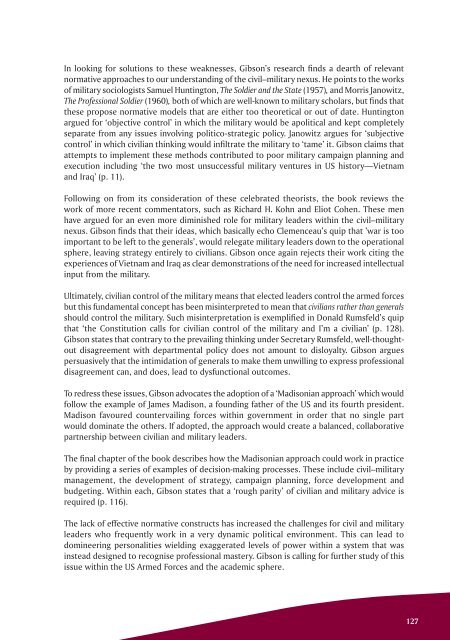ISSUE 176 : Jul/Aug - 2008 - Australian Defence Force Journal
ISSUE 176 : Jul/Aug - 2008 - Australian Defence Force Journal
ISSUE 176 : Jul/Aug - 2008 - Australian Defence Force Journal
Create successful ePaper yourself
Turn your PDF publications into a flip-book with our unique Google optimized e-Paper software.
In looking for solutions to these weaknesses, Gibson’s research finds a dearth of relevant<br />
normative approaches to our understanding of the civil–military nexus. He points to the works<br />
of military sociologists Samuel Huntington, The Soldier and the State (1957), and Morris Janowitz,<br />
The Professional Soldier (1960), both of which are well-known to military scholars, but finds that<br />
these propose normative models that are either too theoretical or out of date. Huntington<br />
argued for ‘objective control’ in which the military would be apolitical and kept completely<br />
separate from any issues involving politico-strategic policy. Janowitz argues for ‘subjective<br />
control’ in which civilian thinking would infiltrate the military to ‘tame’ it. Gibson claims that<br />
attempts to implement these methods contributed to poor military campaign planning and<br />
execution including ‘the two most unsuccessful military ventures in US history—Vietnam<br />
and Iraq’ (p. 11).<br />
Following on from its consideration of these celebrated theorists, the book reviews the<br />
work of more recent commentators, such as Richard H. Kohn and Eliot Cohen. These men<br />
have argued for an even more diminished role for military leaders within the civil–military<br />
nexus. Gibson finds that their ideas, which basically echo Clemenceau’s quip that ’war is too<br />
important to be left to the generals’, would relegate military leaders down to the operational<br />
sphere, leaving strategy entirely to civilians. Gibson once again rejects their work citing the<br />
experiences of Vietnam and Iraq as clear demonstrations of the need for increased intellectual<br />
input from the military.<br />
Ultimately, civilian control of the military means that elected leaders control the armed forces<br />
but this fundamental concept has been misinterpreted to mean that civilians rather than generals<br />
should control the military. Such misinterpretation is exemplified in Donald Rumsfeld’s quip<br />
that ‘the Constitution calls for civilian control of the military and I’m a civilian’ (p. 128).<br />
Gibson states that contrary to the prevailing thinking under Secretary Rumsfeld, well-thoughtout<br />
disagreement with departmental policy does not amount to disloyalty. Gibson argues<br />
persuasively that the intimidation of generals to make them unwilling to express professional<br />
disagreement can, and does, lead to dysfunctional outcomes.<br />
To redress these issues, Gibson advocates the adoption of a ‘Madisonian approach’ which would<br />
follow the example of James Madison, a founding father of the US and its fourth president.<br />
Madison favoured countervailing forces within government in order that no single part<br />
would dominate the others. If adopted, the approach would create a balanced, collaborative<br />
partnership between civilian and military leaders.<br />
The final chapter of the book describes how the Madisonian approach could work in practice<br />
by providing a series of examples of decision-making processes. These include civil–military<br />
management, the development of strategy, campaign planning, force development and<br />
budgeting. Within each, Gibson states that a ‘rough parity’ of civilian and military advice is<br />
required (p. 116).<br />
The lack of effective normative constructs has increased the challenges for civil and military<br />
leaders who frequently work in a very dynamic political environment. This can lead to<br />
domineering personalities wielding exaggerated levels of power within a system that was<br />
instead designed to recognise professional mastery. Gibson is calling for further study of this<br />
issue within the US Armed <strong>Force</strong>s and the academic sphere.<br />
127

















